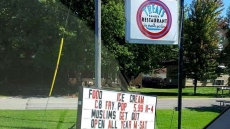RICHMOND, B.C. — The federal government gave conditional approval Tuesday to the massive Pacific NorthWest LNG project planned for British Columbia's northwest coast.
Environment Minister Catherine McKenna, Natural Resources Minister Jim Carr and Fisheries Minister Dominic LeBlanc travelled to Richmond, B.C., to announce their government's acceptance of what is expected to be one of the largest infrastructure investments in Canadian history.
There are 190 legally binding conditions attached to the approval, including for the first time the imposition of a condition placing a maximum cap on greenhouse gas emissions, McKenna said.
"This project was subject to a rigorous environmental assessment and today's announcement reflects this commitment," she told a news conference, which was interrupted by three hecklers from the Lax Kw'alaams First Nations band as the ministers spoke outdoors on the waterfront near Vancouver's airport.
The Petronas-led $36-billion liquefied natural gas project on Lelu Island near Prince Rupert, B.C., would ship 19 million tonnes a year of liquefied gas to markets in Asia while pumping more than five million tonnes of carbon dioxide annually into the atmosphere. That would make it one the largest single greenhouse gas emitters in Canada, according to the Canadian Environmental Assessment Agency.
The government's conditional approval sets the table for an autumn of more crucial decisions on a national climate change plan and energy sector infrastructure.

But it doesn't necessarily mean the massive LNG project will ever get underway.
Low global oil prices and an increasing supply of natural gas have depressed international prices for LNG, making the economics of the project less certain than they were when it was first announced in 2013.
Pacific NorthWest LNG said in a statement Tuesday that it was pleased with the government's announcement.
"Moving forward, Pacific NorthWest LNG and our shareholders will conduct a total project review over the coming months prior to announcing next steps for the project," said Adnan Zainal Abidin, president of Pacific NorthWest LNG.
Despite the market uncertainty, the decision by the cabinet of Prime Minister Justin Trudeau signals the course the new Liberal government will navigate among competing interests on the energy and environment files.
"The only way to get resources to market in the 21st century is if they can be done in a responsible and sustainable manner," McKenna said in a news release. "This decision reflects this objective."
The government says the conditions it is placing on the project are aimed at minimizing effects on fish, fish habitat, marine mammals, wetlands, migratory birds and human health.
But environmental groups saw a contradiction in the government's approach.
"Approving this project is inconsistent with the federal government's commitments to lead on climate change and clean innovation," said Merran Smith, executive director of Clean Energy Canada. "The conditions that come with this approval set the bar too low."
Karen Mahon, national director of Stand Earth, said the group expected a different approach from the Liberals.
"How can Prime Minister Trudeau claim to be a climate leader on the international stage, while approving this new project that will become the single largest source of climate pollution in the country," she said in a news release.
Carr said the facility will add nearly $2.4 billion per year in Canada's GDP.

"This project further plants the Canadian flag on the world stage of natural gas exporters. Positions us to supply dynamic emerging economies while contributing to the fight against climate change."
He said for the first time ever, there will be environmental monitoring committees watching over the project, in partnership with indigenous communities to share information on compliance and enforcement.
He said both First Nations affected by the project have been invited to be part of the committee.
But not all indigenous peoples in the area are pleased with the government's decision.
"It's a sad, sad day for our community," said Christine Smith-Martin of the Lax Kw'alaams First Nation, who was at the announcement and has concerns about the impact the project will have on salmon in the region.
The consultation process has been flawed because the government has been speaking with elected officials who don't necessarily represent the views of the entire community, she added.

The community won't stop fighting the project now, Smith-Martin said.
"When you talk about salmon, this is gold to our people. This decision isn't going to go by lightly. There's going to be a lot of people heading out to Lelu Island to protect it. I can guarantee that."
Even before the government said it was pulling the trigger Tuesday, a group of six First Nations from the Skeena corridor issued a release saying the project "does not meet the test" for respecting indigenous rights and would be challenged in court.
"Providing a green light for this project at this time will only lead to protracted litigation which benefits no one," said the Skeena Corridor First Nations, whose traditional lands include Lelu Island where the project will be centred.
Ottawa says an estimated 4,500 jobs would be created during the construction phase of the project, and 630 workers would be needed to operate the facility.
Environmentalists and First Nations have denounced the Pacific NorthWest LNG project due to concerns over salmon habitat as well, while pro-development advocates, including the B.C. government of Christy Clark, have called it a key economic driver for the country as a whole.

At Tuesday's announcement, Clark said B.C. has as much natural gas as Alberta has oil in its oil fields.
Conservative interim Leader Rona Ambrose said in Ottawa that Trudeau had only one decision he could make on the project, and the prime minister now needs to "champion the project" to help make it a reality.
"He needs to make this project important, not only for British Columbians, but for all Canadians," said Ambrose, citing the job creation and investment potential.
McKenna will carry the Pacific Northwest decision into a meeting with her provincial and territorial counterparts next Monday in Montreal, where they are set to begin negotiations on a strategy for meeting Canada's international climate commitments.
Canada has pledged to reduce its emissions 30 per cent from 2005 levels by 2030, but the country's greenhouse gas output has been on a slow but steady rise for the last five years.

A draft assessment of the Pacific NorthWest project released in February found that it would emit 5.3 million tonnes of carbon dioxide a year for 30 years, not including another 6.5 million to 8.7 million tonnes produced from natural gas collection and transportation.
"This will increase the B.C. and national emission totals by 8.5 per cent and 0.75 per cent respectively, based on 2011 levels," said an early project assessment.
The Liberals added an additional three-month assessment period last spring to gather more information, and the final Canadian Environmental Assessment Agency report was delivered last week.
It won't be the first difficult call for the Liberals this fall.
The government must decide by mid-December whether to approve the proposed expansion of the Trans Mountain oil pipeline from Alberta to Burnaby, B.C., while also negotiating a climate policy with the provinces and territories that McKenna has said will include a national floor price on carbon.
FIVE THINGS TO KNOW ABOUT THE PROPOSED PACIFIC NORTHWEST LNG PROJECT IN B.C.
RICHMOND, B.C. — Federal cabinet has conditionally approved the $36-billion Pacific NorthWest liquefied natural gas project. Here are five things to know about the proposed project:
The Players:
Petronas, the Malaysian state-owned oil and gas giant, is leading the development. It has a 62 per cent stake in both the LNG processing facility on Lelu Island and the natural gas reserves in northeastern B.C. that would feed into it. Other partners include Sinopec with a 15 per cent stake, JAPEX and the Indian Oil Corp. with 10 per cent each, and PetroleumBRUNEI with three per cent.

The Product:
LNG is produced by cooling natural gas (consisting mostly of methane) to minus 162 degrees Celsius in order to make it a liquid. LNG takes up 1/600th of the space that it takes up in its gaseous state. The export facility would take in up to 3.2 billion cubic feet of natural gas per day and produce up to 19.2 million tonnes of LNG a year.
The Environmental Impact:
The draft environmental report released in February estimated that the LNG facility would result in the equivalent of 5.3 million tonnes of carbon dioxide being released a year. That would add 8.5 per cent to B.C.'s total emissions. Upstream emissions, including the gathering of the natural gas, are estimated to add the equivalent of 6.5 million to 8.7 million more tonnes of CO2.
State of the Industry:
A glut of global LNG projects have led to a drop in prices and prospects for LNG as well. The Shell-led LNG Canada project, which would have been built near Kitimat, B.C., was indefinitely delayed in July. AltaGas Ltd. also shelved its smaller Douglas Channel LNG project in February.
The Costs:
The entire Pacific NorthWest LNG project is estimated to cost $36 billion. That includes about $11 billion for the export terminal, $6.5 billion in pipelines, the $5.5 billion Petronas spent buying Progress Energy, and the roughly $2 billion a year the consortium would spend on drilling and production of natural gas to get the project fully operational.
TIMELINE OF PROPOSED PACIFIC NORTHWEST LNG PROJECT IN BRITISH COLUMBIA
Feb. 19, 2013: Pacific NorthWest LNG submits its project description to the Canadian Environmental Assessment Agency.
April 29, 2013: Japan Petroleum Exploration Co. Ltd. agrees to buy 10 per cent of the liquefied natural gas that would be produced from Pacific NorthWest LNG over at least 20 years. This marks the first secure buyer for the project's LNG.
July 5, 2013: Pacific NorthWest LNG applies to the National Energy Board for a licence to export up to 19.68 million tonnes of LNG annually for 25 years, beginning in 2019.
Dec. 16, 2013: The NEB grants Pacific NorthWest LNG a licence to export up to 22.2 million tonnes of LNG annually for 25 years.
Feb. 28, 2014: Pacific NorthWest LNG submits its environmental impact statement to the Canadian Environmental Assessment Agency.
March 26, 2014: The federal government approves Pacific NorthWest LNG's export licence.
June 11, 2015: In its final investment decision, Pacific NorthWest LNG announces it will proceed with the project as long as it satisfies two conditions: approval of a project development agreement by the B.C. legislature and clearing the federal environmental assessment review process.
July 21, 2015: The B.C. government passes legislation that ratifies a project development agreement with Pacific NorthWest LNG.
March 21, 2016: The federal government grants the Canadian Environmental Assessment Agency more time to review the project.
Sept, 27, 2016: The Trudeau government gives conditional approval to the project.


